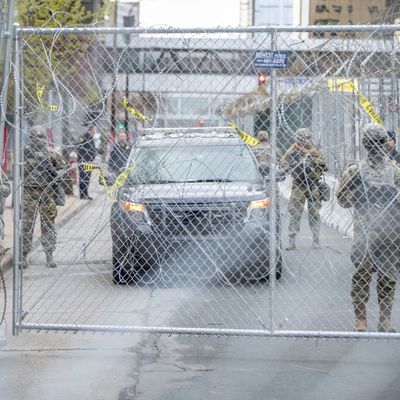
As jurors began their second day of deliberating in the Derek Chauvin murder trial on Tuesday, Minneapolis and surrounding areas made preparations for possible civil unrest in the aftermath of a verdict.
The Washington Post reports that more than 3,000 National Guard troops and at least 1,100 other public-safety agency employees have been called in to assist local police in a show of force dubbed Operation Safety Net. The militarized presence on the streets of the city — even in residential areas — is an effort to avoid a repeat of the scenes last summer after George Floyd’s death, in which rioters burned down a police station and caused widespread damage around the city.
But heavy-handed tactics by police officers during that time alienated plenty of residents and politicians, and many are not thrilled with the authorities’ current posture.
Kenza Hadj-Moussa, the public affairs director for the progressive organization TakeAction Minnesota, told the Minneapolis Star-Tribune that the heavy police presence was “just compounding the trauma, especially with what Black Minnesotans are going through right now.”
Minneapolis’s city council — which pledged to abolish the police last year — voted overwhelmingly to curb law enforcement’s combativeness, including the use of tear gas, but it does not have the power to enforce such measures. The city’s mayor, Jacob Frey, has tried to walk the line between the two sides, endorsing the measures as a temporary solution.
Police-protester tensions have been recharged in the area after the killing of Daunte Wright earlier this month. As part of Operation Safety Net, cops have arrested dozens of people, used tear gas liberally, and aggressively detained journalists during clashes in the town of Brooklyn Center, about ten miles from Minneapolis. Their tactics have drawn a rebuke from the town’s mayor.
In another sign of Minneapolis’s caution around the Chauvin verdict, the city’s public schools have been closed for in-person learning from Wednesday through Friday.
Local authorities will get an assist from Facebook. The company said on Monday that it had deemed Minneapolis a temporarily “high-risk location” and would “limit content that could lead to civil unrest or violence,” which will include posts that encourage bringing arms into the area.
Chauvin’s trial, which lasted four weeks and included days of gut-wrenching testimony that revisited the grim details of Floyd’s death, wrapped up on Monday afternoon.
Chauvin faces three charges: second-degree unintentional murder, third-degree murder, and second-degree manslaughter. If convicted, his sentence will be decided by the judge in the case, with a wide range of prison time possible depending on which charge, or charges, are in play.






























